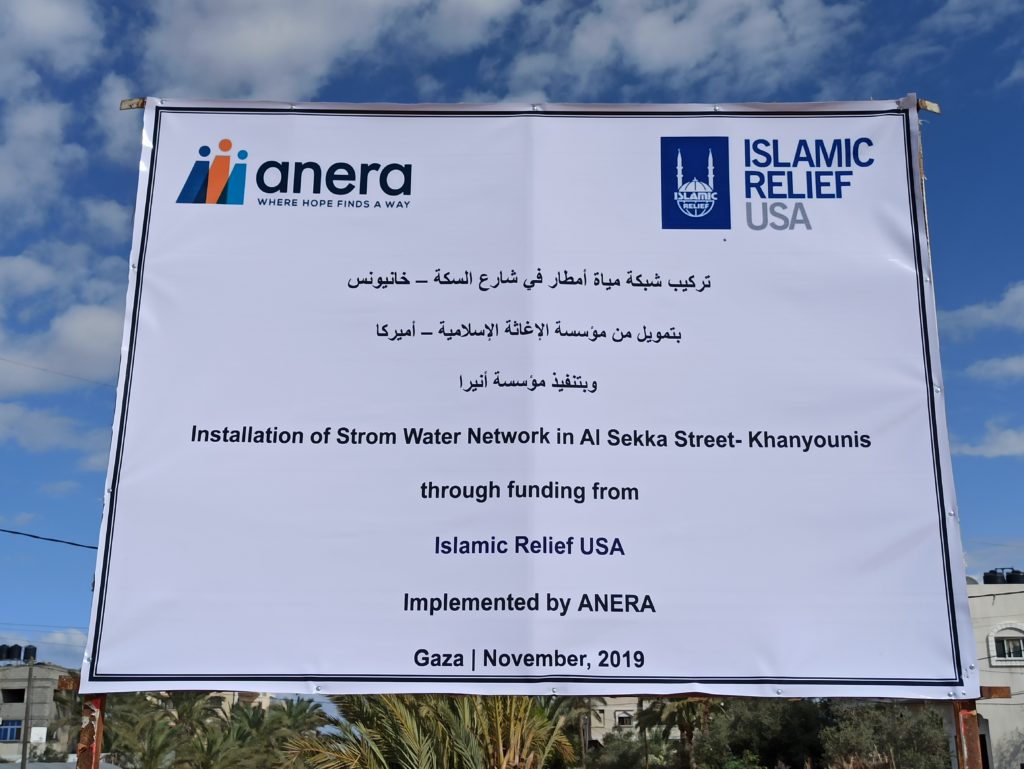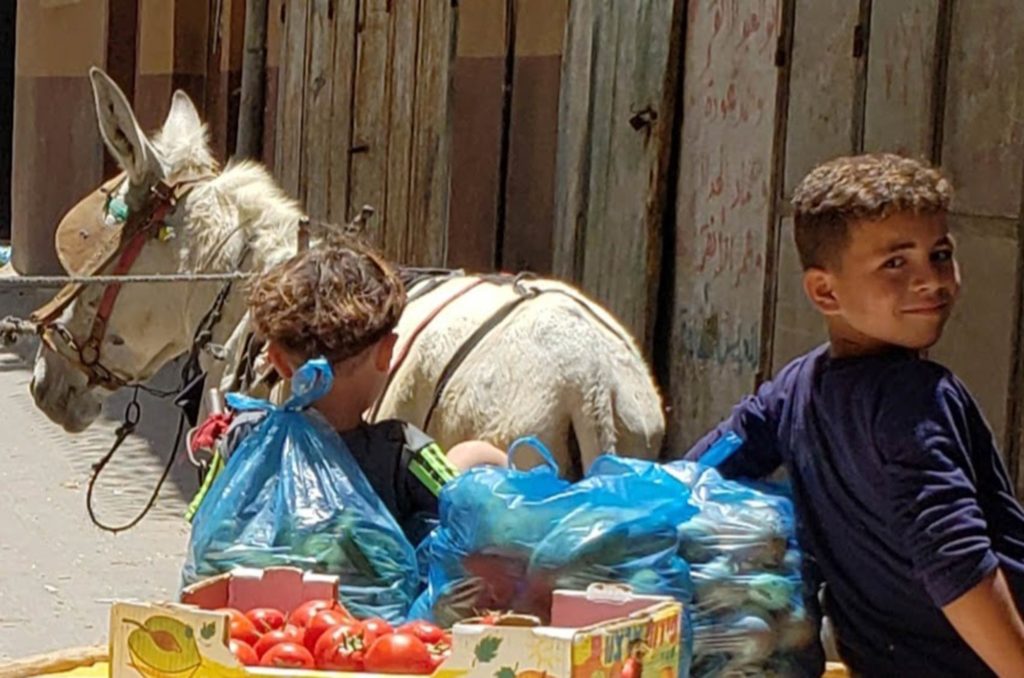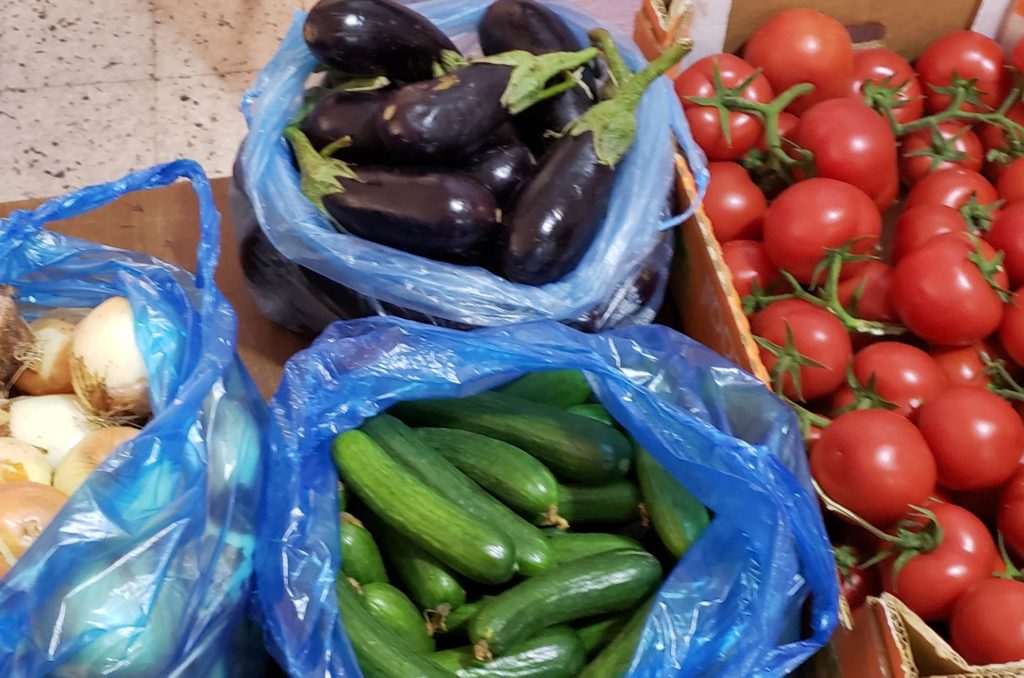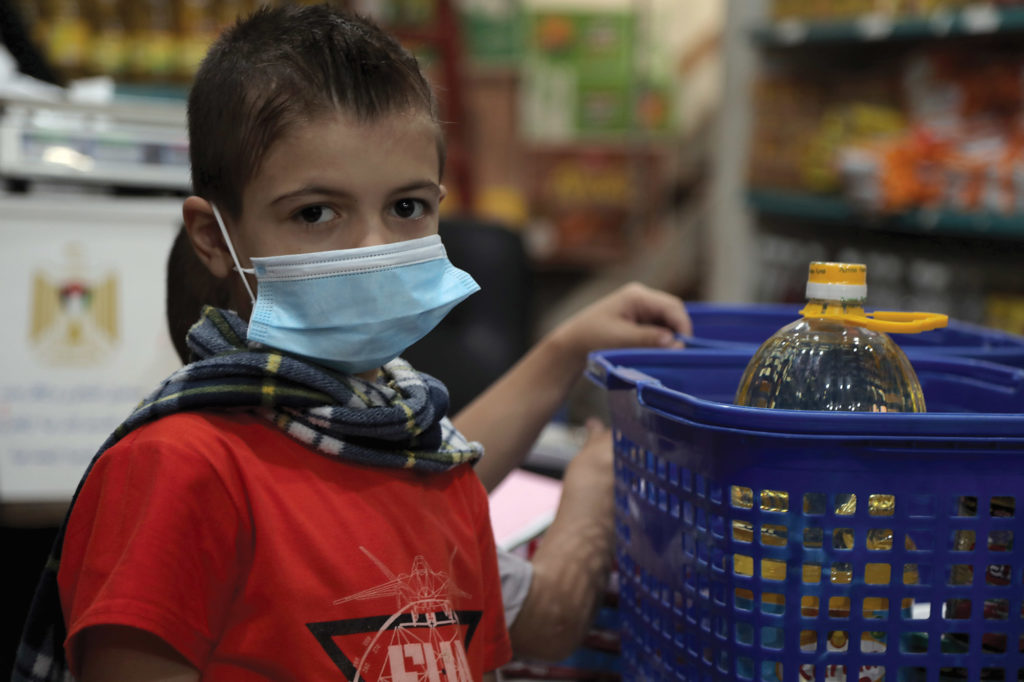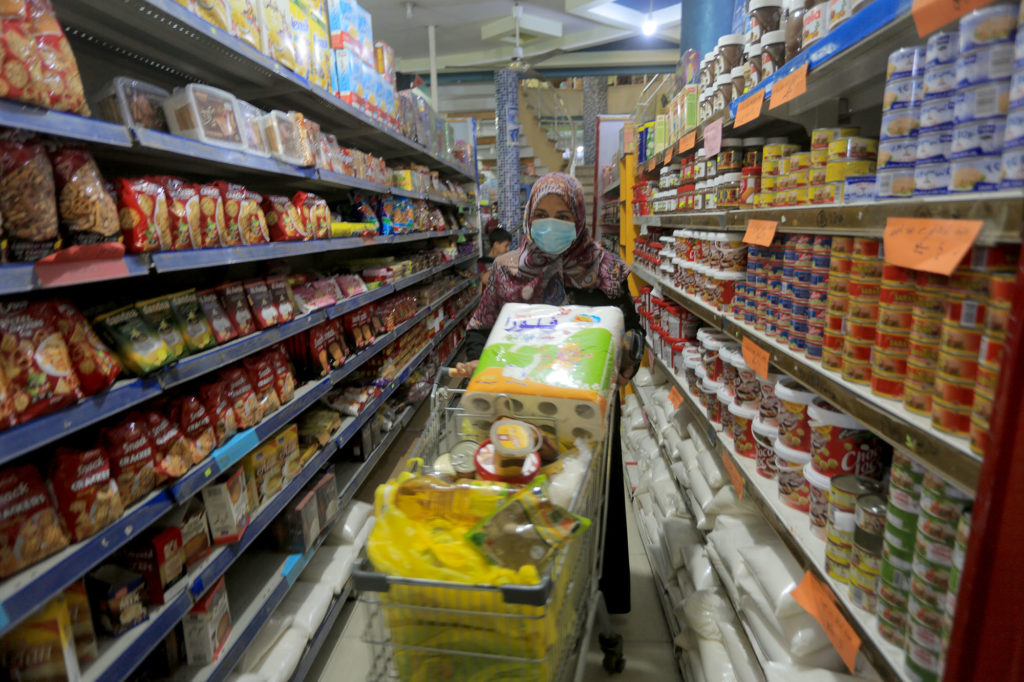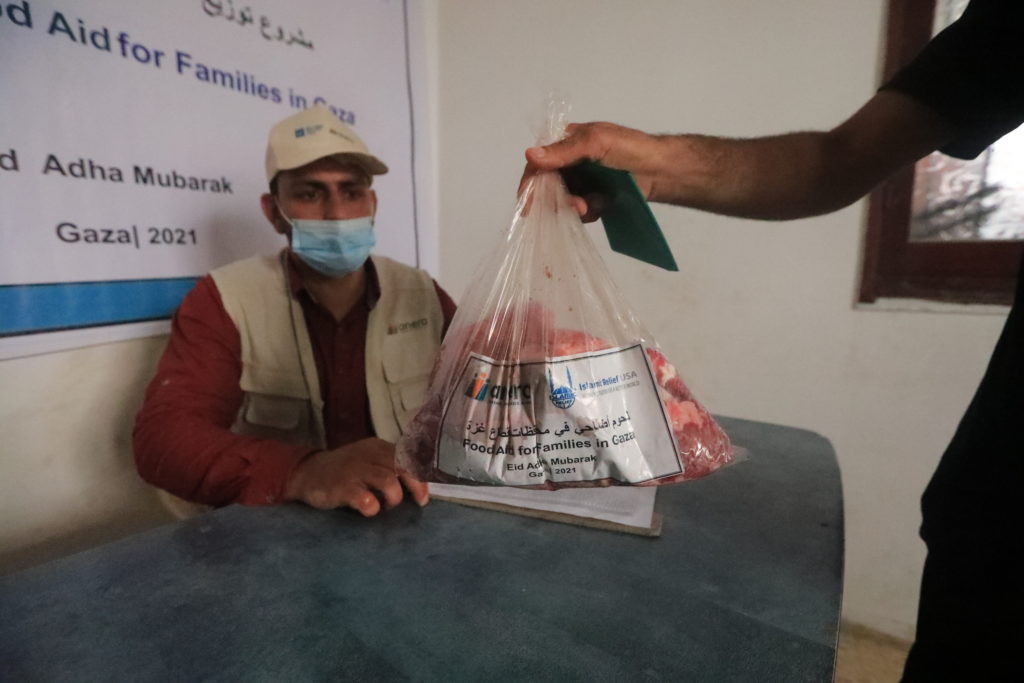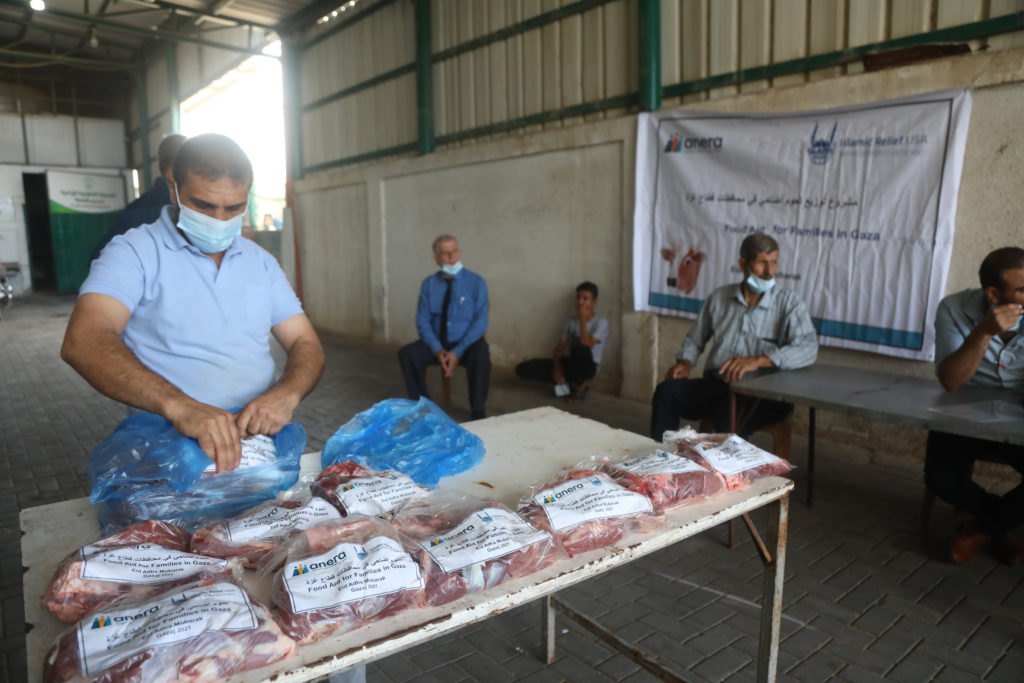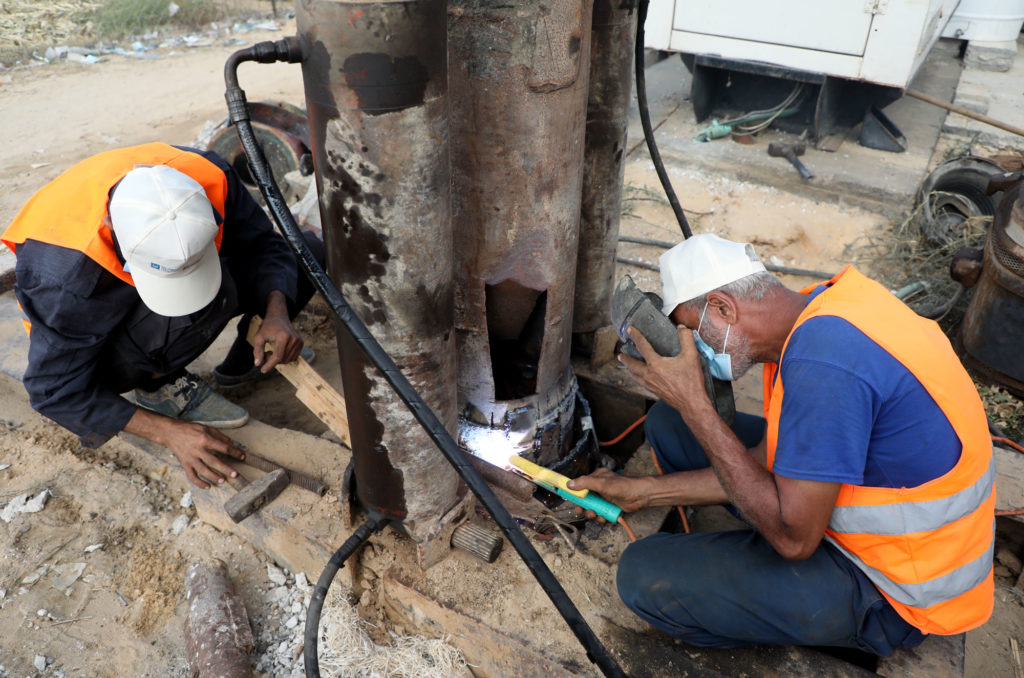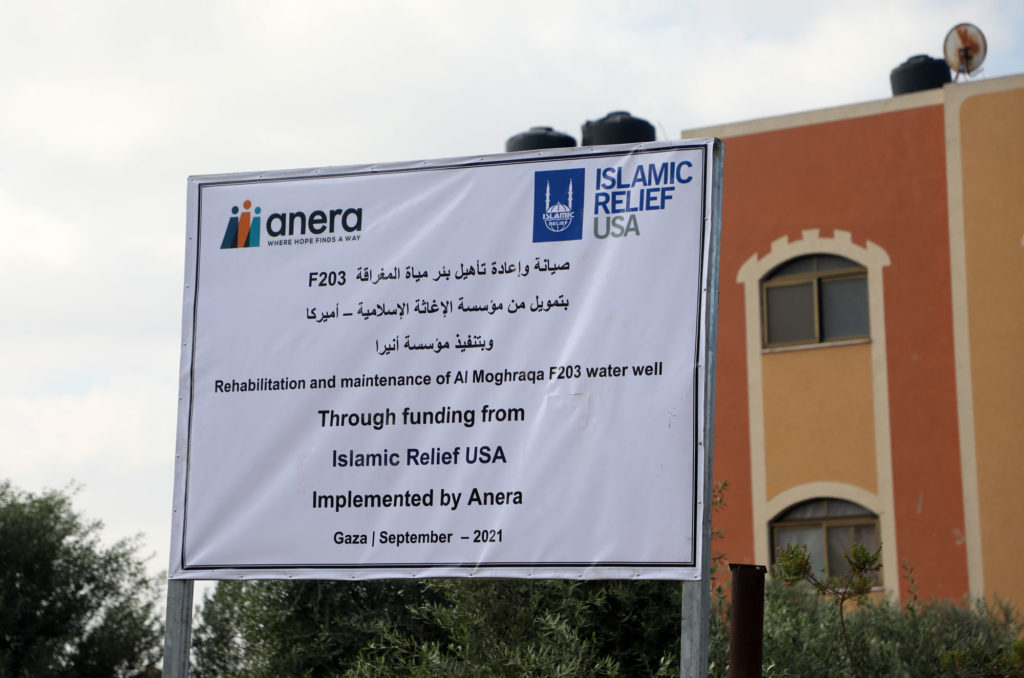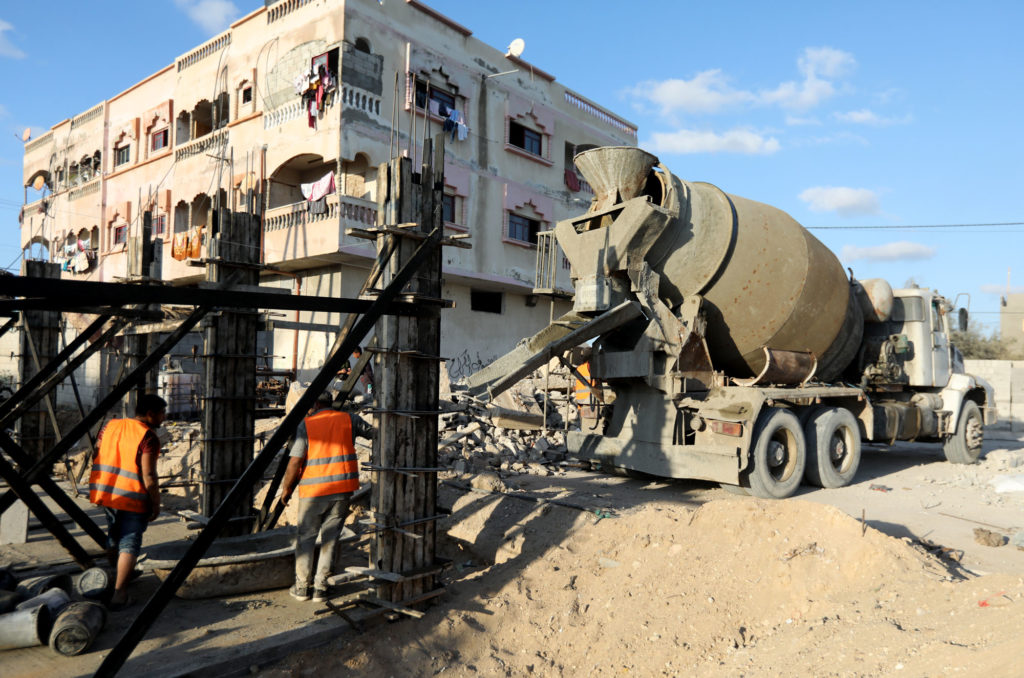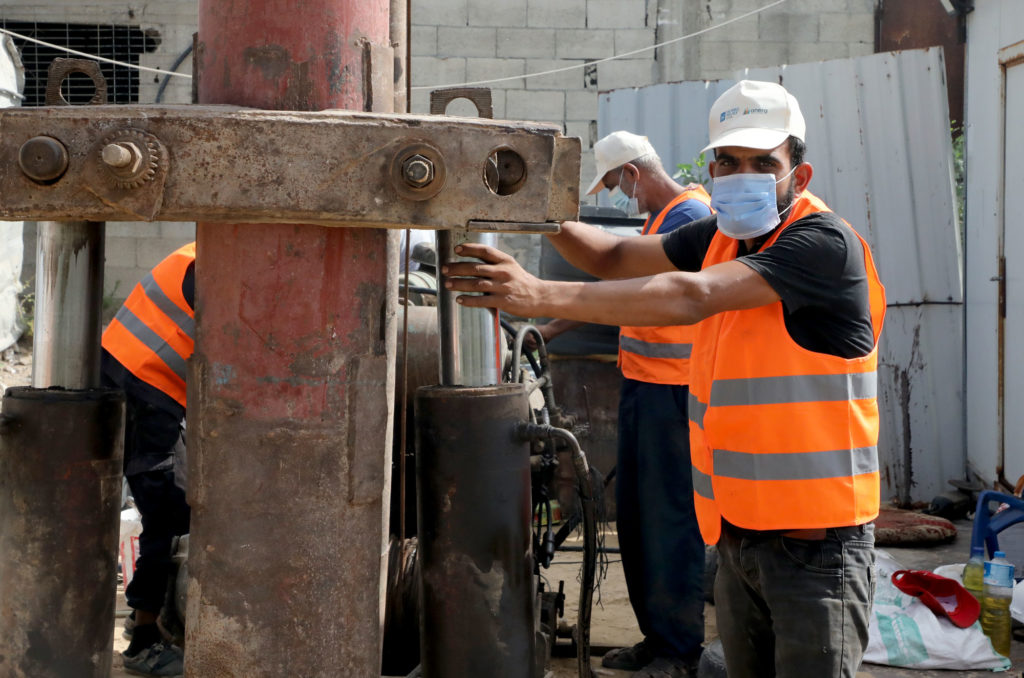A History of the Anera-Islamic Relief USA Partnership in Palestine 2014 – 2021
Posted in: Programs
Since 2014, Anera and Islamic Relief USA (IRUSA) have partnered to improve the communities and lives of vulnerable Palestinians. The interventions implemented by Anera and IRUSA address critical needs related to water, sanitation, and hygiene (WASH); early childhood development; livelihoods; health; food security; and emergency response. Anera and IRUSA’s shared priorities include principles of sustainability and integrating the needs of women, youth, and vulnerable groups.
Anera and IRUSA’s long relationship has allowed both organizations to respond quickly in crises in tandem with long-term sustainable development. In every major conflict since 2014, IRUSA has been a critical partner in the emergency response. The partnership enables Anera to bring food and medicines to those left vulnerable from these events. Anera’s staff in Gaza are from the communities they serve. They provide critical situational analysis that informs Anera and IRUSA’s medium- and long-term responses in Gaza. This partnership has increased Anera’s expertise in areas including women’s economic empowerment and water, sanitation, and hygiene projects, leading to innovative, green, cutting-edge solutions to Gaza’s chronic needs.
Urgent Water System Repairs for Gaza | 2014
- Direct Beneficiaries: 12,000+
- Indirect Beneficiaries: 330+
In response to the damage sustained by critical WASH infrastructure during the 2014 conflict in Gaza, Anera and IRUSA launched the Urgent Water Systems Repair Program. The intervention restored water supply lines to homes and communities that sustained damage, reconnecting 600 houses to water networks and 220 houses to wastewater networks, benefitting at least 12,000 people.
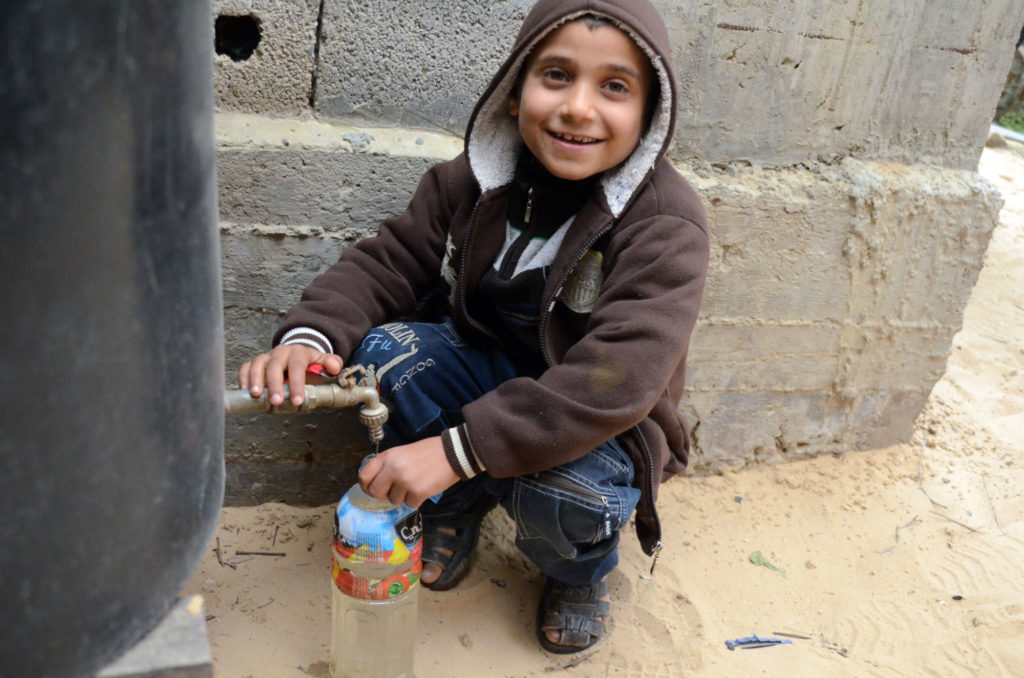

Anera repaired and replaced damaged rooftop water storage tanks, and installed about 16,000 linear meters of water pipes and about 4,500 linear meters of wastewater pipes. Anera engineers consulted with the community and the Palestinian Water Authority to conduct assessments, prioritize projects, and design interventions based on community needs. To complete the project, Anera collaborated with local firms and procured local materials, stimulating the local economy. In total, the project created more than 60 job opportunities for approximately 1,600 labor days.
Right Start! Early Childhood Development Program | 2014
- Direct Beneficiaries: 2,883
- Indirect Beneficiaries: 3,000+
Anera and IRUSA launched the Right Start! program in Gaza in 2014 to improve the quality of early childcare, education, and development for preschool children in 10 kindergartens in Khan Younis, Deir El Balah, Jabalia Refugee Camp, Rafah, Beit Lahia, Shuja’iah, and Gaza City. Anera renovated the 10 schools and provided teacher training and workshops. Anera also developed and distributed Haya Naqra (“Let’s Read”) reading packs for children at the preschools. To promote positive parenting, Anera conducted community awareness sessions for parents.
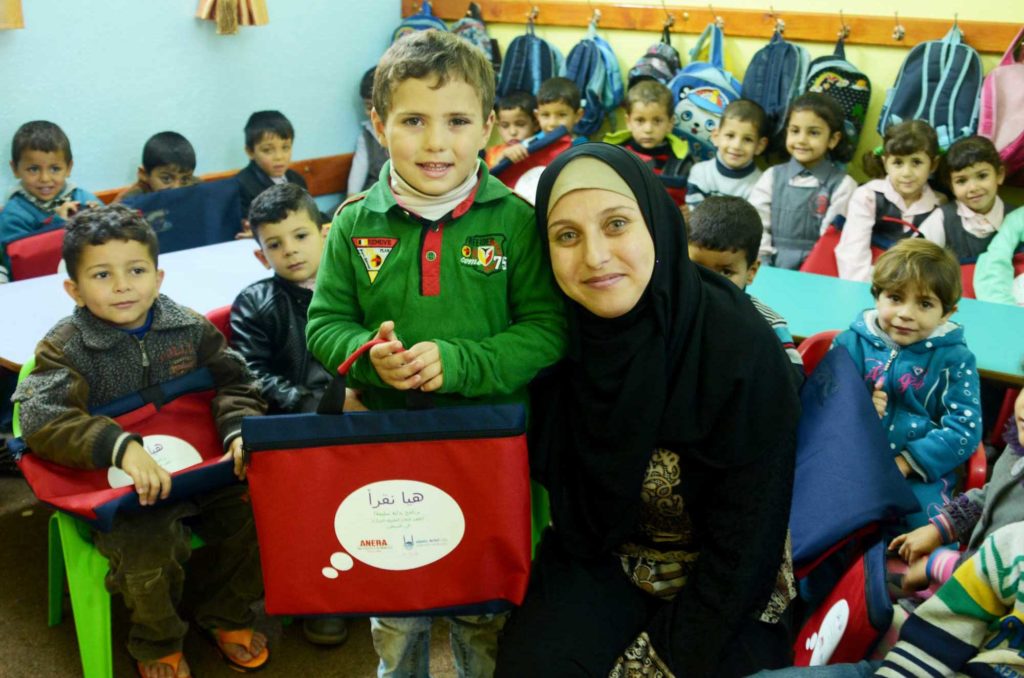

The project improved learning environments through teacher training. It also raised awareness of the importance of reading and interactive play for children. Sixty-three teachers and head teachers benefited from training and mentorship in the program. Six other teachers also received indirect training resources from the project. One thousand eight hundred twelve children in 11 preschools benefited from improved teaching and learning environments. They were able to take part in spring camps and early childhood development activities. One thousand eight parents and caregivers participated in 30 positive parenting training sessions. Anera estimated that over 3,000 children benefited indirectly as a result of positive parenting skills gained by parents.
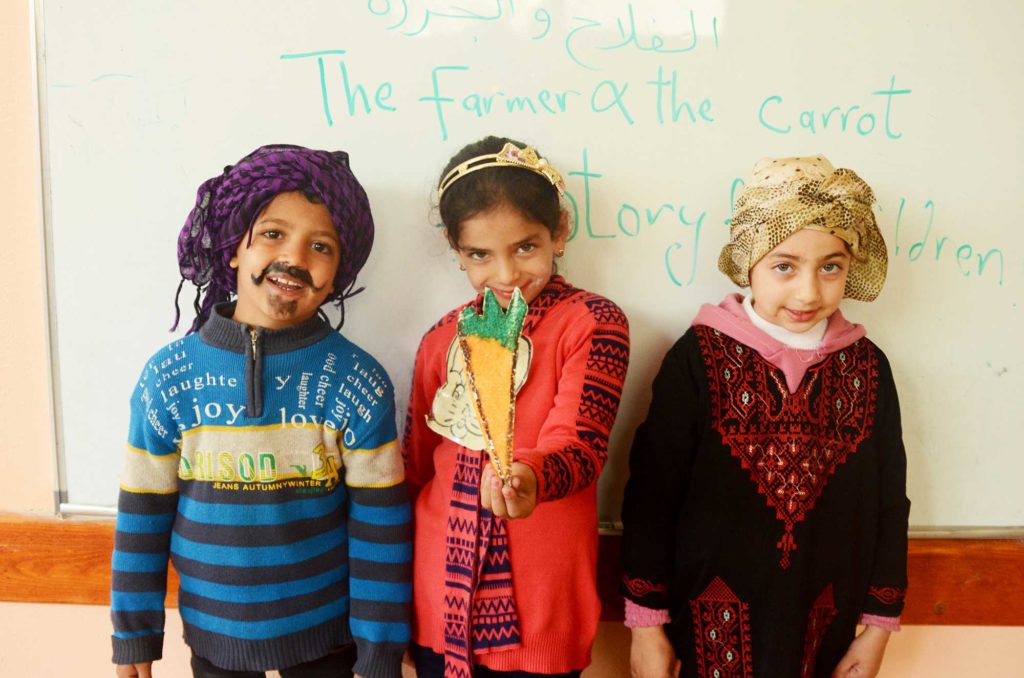

WASH I | 2015
- Direct Beneficiaries: 39,000
- Indirect Beneficiaries: 180,000
In response to Gaza’s limited water access, Anera and IRUSA launched WASH I to increase water access and improve sanitation in Gaza. Anera replaced old and deteriorated water and wastewater networks with new ones. Anera also distributed hygiene supplies and conducted WASH education campaigns. The supplies and campaigns educated community members on best practices for mitigating the health risks associated with unclean water and poor hygiene and sanitation. WASH I improved the living conditions of more than 39,000 Palestinians. The beneficiaries included 23,000 children living in 10 communities in Gaza. Anera completed 21 water and wastewater systems through the intervention. It also installed 18,990 meters of water pipes and 12,504 meters of wastewater pipes. Finally, Anera conducted 85 WASH awareness sessions and distributed 4,555 hygiene kits.
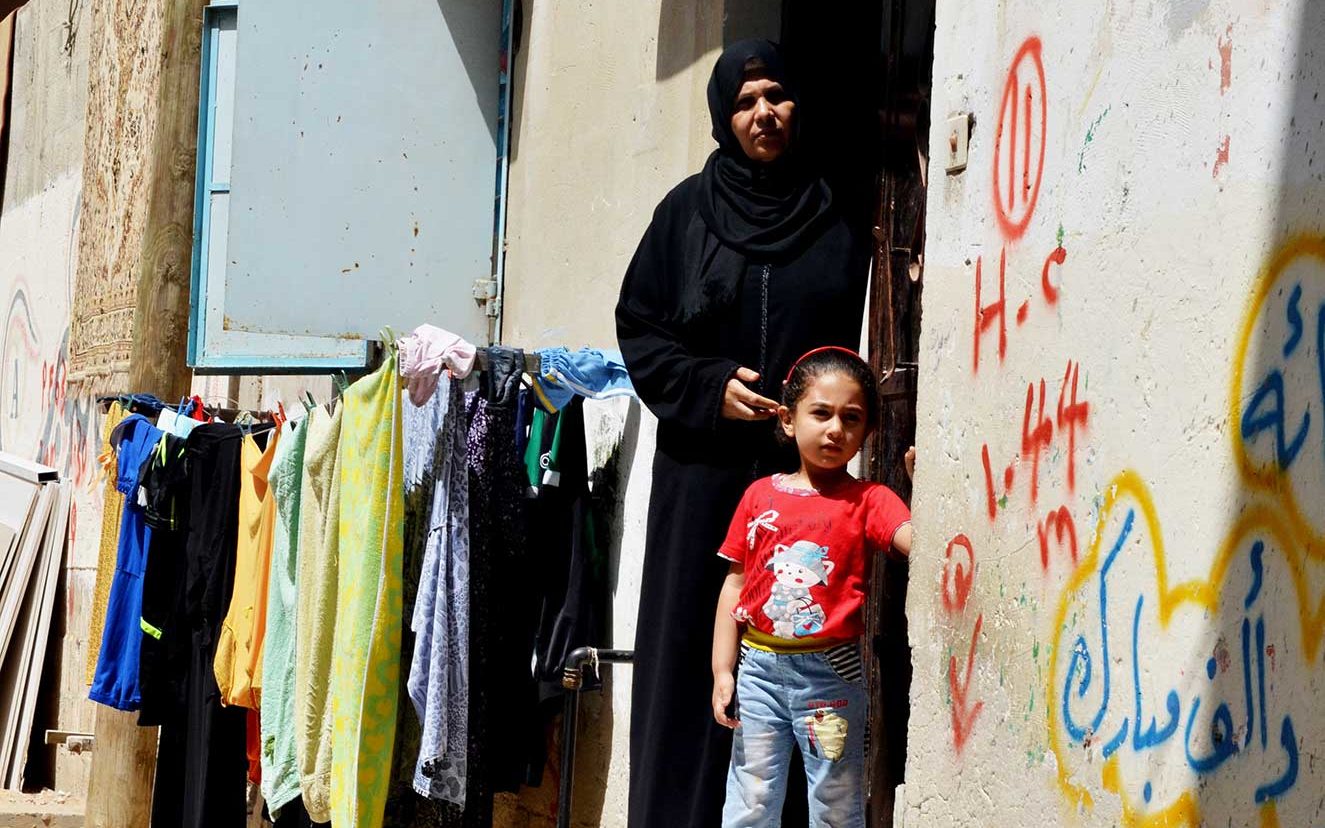

The WASH I program helped families understand how to prevent and recognize parasitic infection. Parents learned how to counter the risk factors of poor hygiene and environmental conditions. The project also enabled beneficiaries to protect the health and wellbeing of their entire families. In particular, beneficiaries learned how to protect the most vulnerable populations from preventable, often life-threatening illnesses.
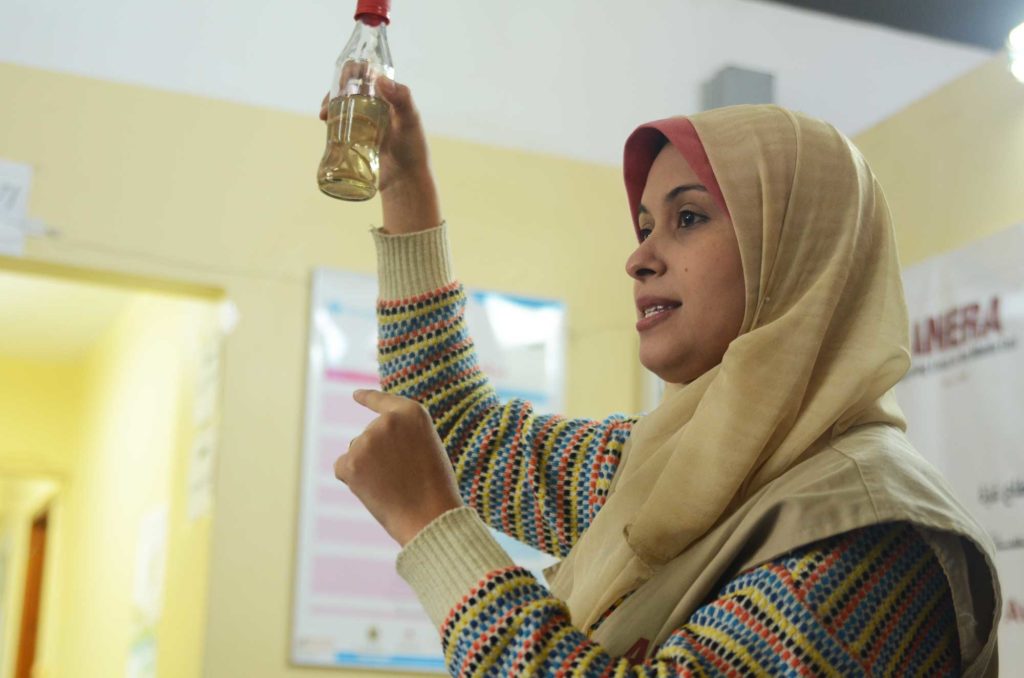

Gaza Rural Recovery Program | 2015
- Direct Beneficiaries: 4,500
- Indirect Beneficiaries: 20,963
The 2014 war caused significant infrastructure damage in Gaza that caused a loss of livelihoods in rural communities. Anera and IRUSA began the Gaza Rural Recovery Program to help rural communities recover after the war and restore livelihoods by repairing agricultural infrastructure. The repairs enabled farmers to bring their products to market and process produce into higher value products. The project restored farms for 260 families and six miles of agricultural roads, restoring and planting an area of 128 acres destroyed during the war. Rehabilitation activities included leveling, plowing, soil preparation, and crop planting. Anera installed irrigation networks and 12 ponds to store water for the clusters of farms. Finally, Anera rehabilitated two square miles of agricultural roads. The rehabilitated roads ensure access to markets and supply chains for smallholder farmers. Results showed that these efforts increased farmers’ income by 46%.
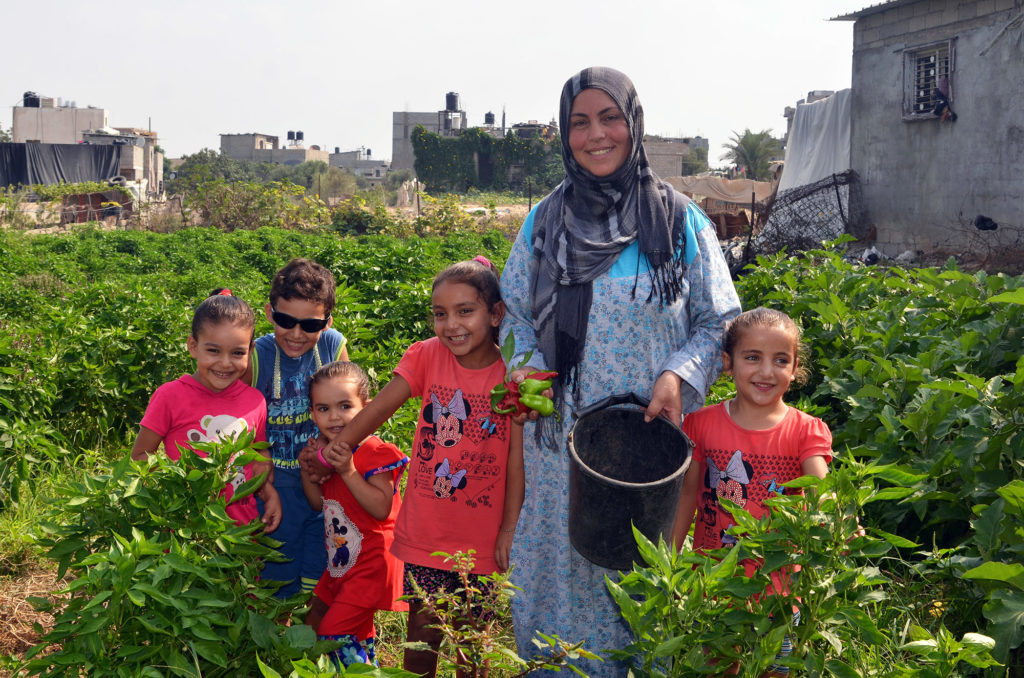

The program provided 64 employees at eight women’s cooperatives with food processing equipment. It also provided 160 households with solar cook stoves to reduce their household fuel costs. Anera supported six cooperatives by adding new tools to existing kitchens. The other two cooperatives started food processing for the first time. Each cooperative employed 8-12 women on an hourly basis. Results showed that the project increased these women’s monthly income by 55%. Through the project, Anera created 6,500 short term job opportunities. The jobs provided income generating opportunities to the local community. By creating these opportunities, Anera indirectly stimulated the local economy.
WASH II | 2017
- Direct Beneficiaries: 40,201
- Indirect Beneficiaries: 150,000
Anera and IRUSA began implementing the second phase of the WASH program in 2017 in Rafah, Khan Younis, Middle City, Gaza City, and North Gaza. The program increased the accessibility of residential water and improved wastewater management. It also upgraded water wells and improved sanitation practices.
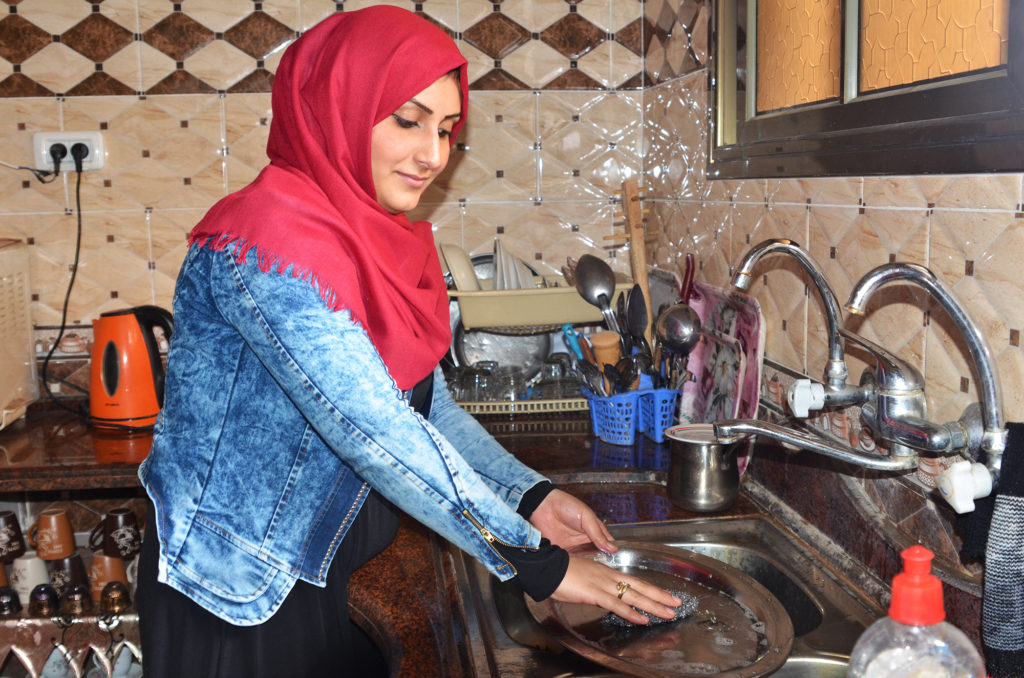

One of the main components of the program focused on maintenance works of Jameel Al Shawa water well. Maintenance included replacing manifolds fittings, the chloride unit, and the electrical network. It also included installing a sunshade, fuel tank, and civil works. The intervention provided potable sources of water to 392 households. Anera did so by connecting households to local water networks. Anera also connected 87 houses to wastewater networks, preventing the households from exposure to pathogens.
Along with infrastructural development, Anera conducted community awareness raising campaigns through the program. The campaigns covered best hygiene practices, including the distribution of hygiene kits and educational materials. Throughout the project, Anera laid more than 16,000 meters of water and wastewater pipes. Anera also distributed more than 1,850 hygiene kits and connected more than 400 homes to water and wastewater networks.
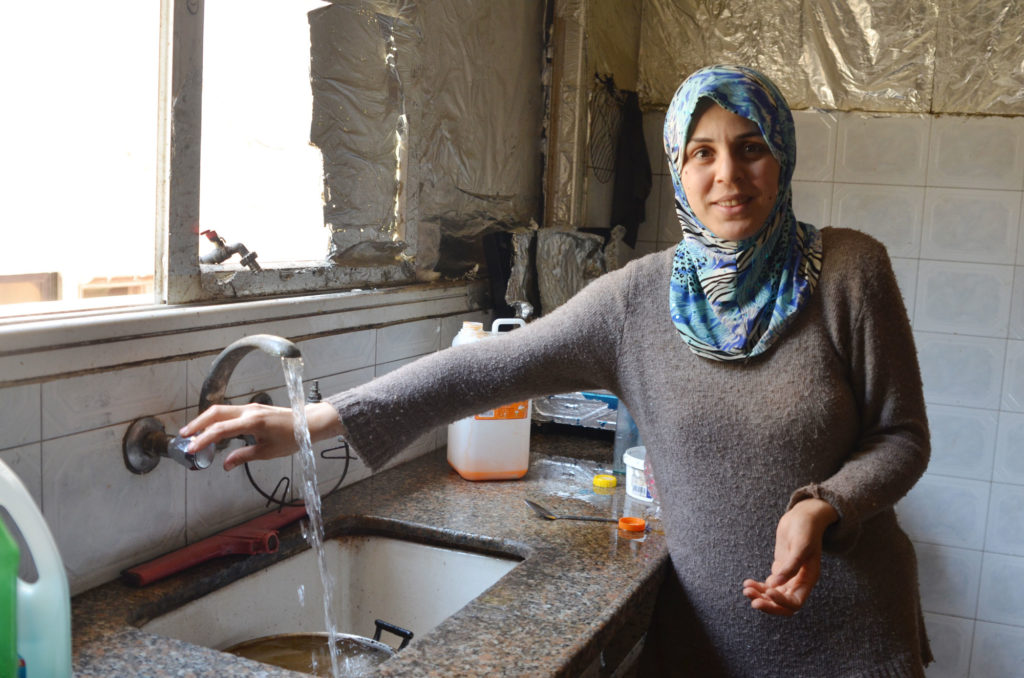

Gaza Health Response | 2018
- Direct Beneficiaries: Roughly 55,000
In the years following the 2014 bombardment, Gaza continued to face restriction impeding reconstruction or economic development. Beginning in March 2018, Gaza experienced one of its most challenging periods. The Great March of Return protests resulted in a worsening humanitarian crisis and left hospitals with a 70% shortage of essential drugs and medical lab testing materials and a 30% shortage of medical supplies.
In response, Anera and IRUSA launched the Gaza Health Response. The project improved Gaza hospitals’ ability to treat patients in critical condition by delivering medicines and supplies requested by Shifa Hospital, Al Ahli hospital, and Central Blood Bank Society. Anera delivered the most critically needed medicine to Shifa Hospital, which is Gaza’s largest public hospital containing the only trauma center. Shifa Hospital provides almost 70% of the public medical services in Gaza in peacetime and serves the entire population. It provides almost 90% of the emergency medical services during war and in times of unrest. Shifa hospital received critical items such as antibiotics, anesthetics, and ibuprofen.
Anera also delivered medical supplies to Al Ahli hospital, which treats over 45,000 patients a year. Al Ahli hospital serves the community of Gaza City and beyond and opens its doors to the wounded and their families in times of crisis. The supplies donated to Al Ahli Hospital included cotton, gauze, and various needles for blood tests and surgeries.
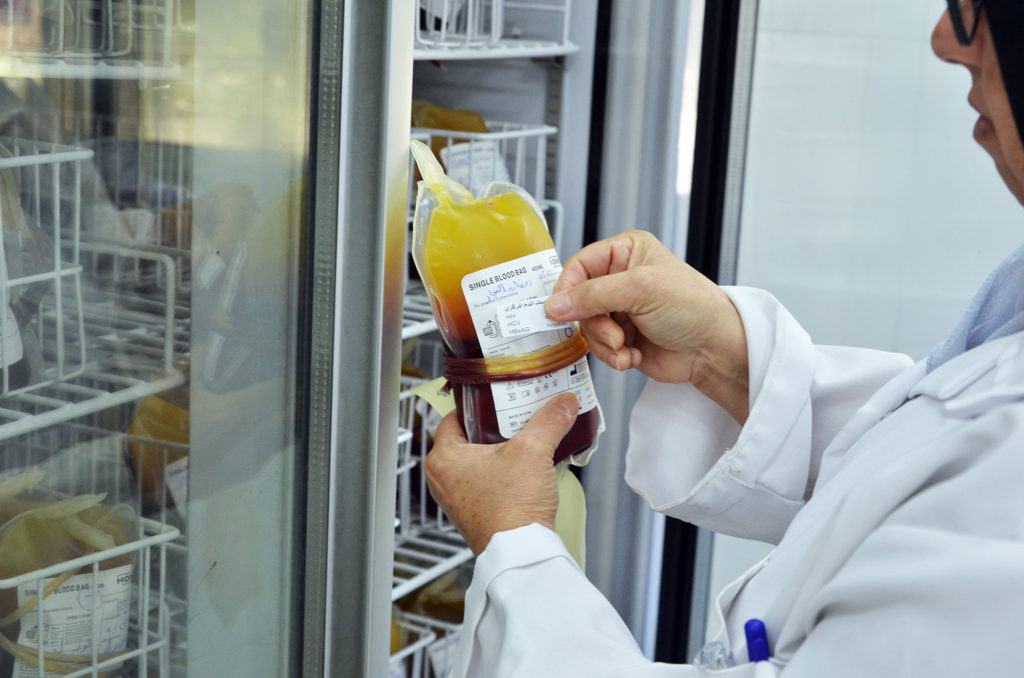

And we delivered supplies to the Central Blood Bank Society, Gaza’s only public blood bank. The Central Blood Bank Society serves the entirety of Gaza. Anera provided supplies and blood kits to the Blood Bank Society, including slides, blood bags, HCV architects, HIV architects, and HBsAg architects.
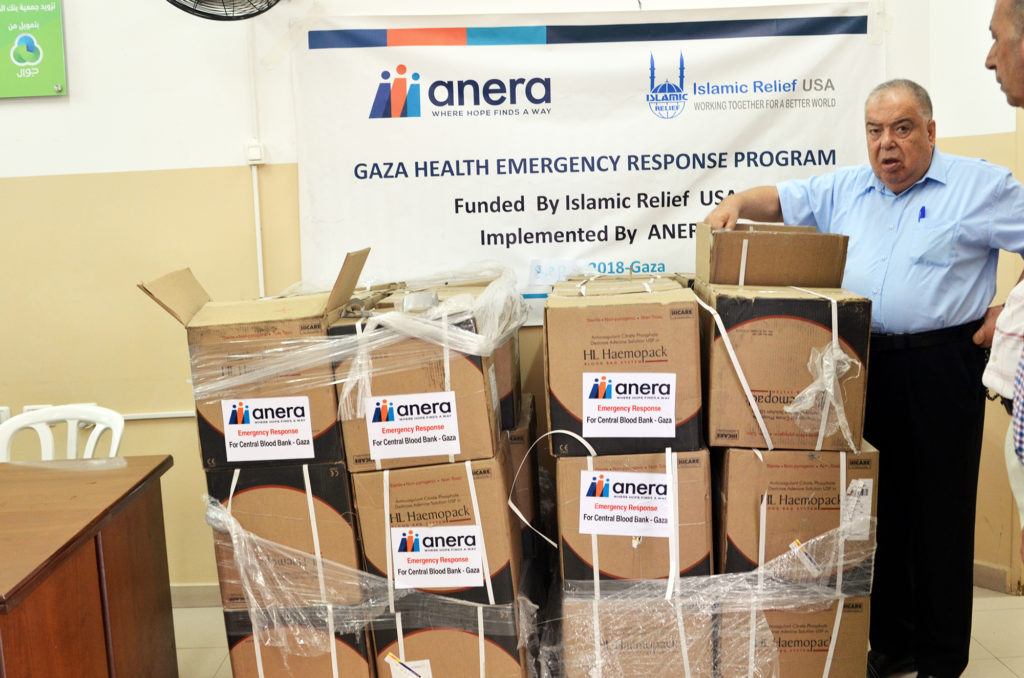

In total, Anera and IRUSA coordinated six shipments of medicines and supplies to address the Gaza emergency. The donations helped Al Ahli Hospital, Shifa Hospital, and the Central Blood Bank Society address the urgent situation in Gaza. Anera met the needs of these organizations by locally procuring medicine and medical supplies. It also delivered shipments of critically needed medicine and medical supplies. By addressing these needs, Anera helped roughly 55,000 people.
Ramadan Food Packages | 2019
- Direct Beneficiaries: 3,729
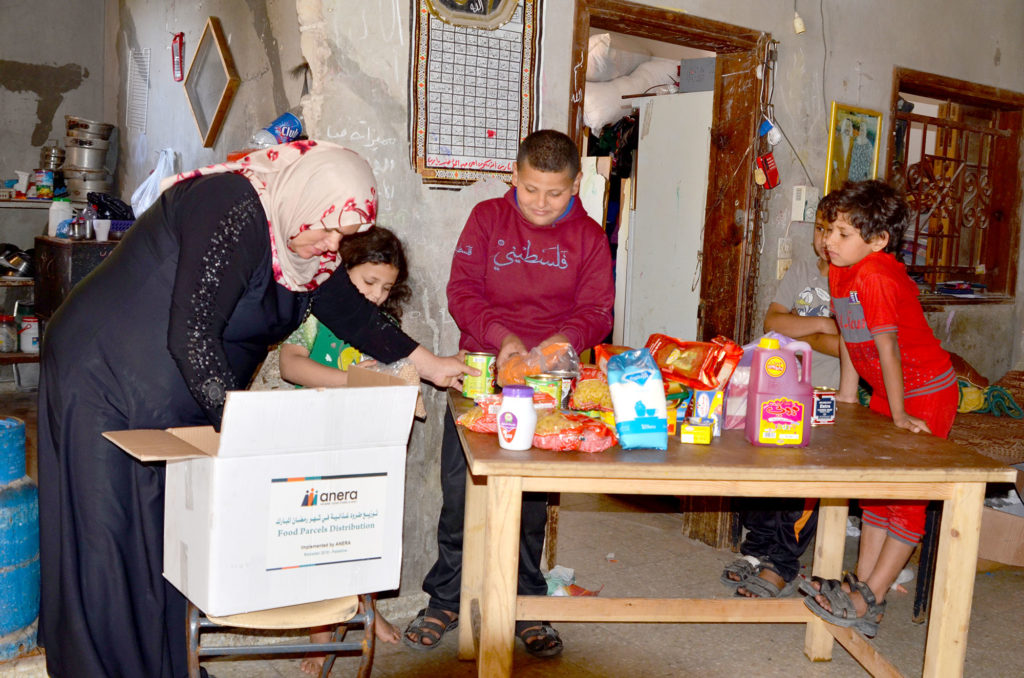

During Ramadan, Muslim families break their daily fasts with the iftar meal to replenish the nutrients of Muslim families after long days of fasting. Vulnerable families often struggle to afford the nutrient-rich foods needed to break their fasts. The Ramadan Food Packages program provided nutritious meals for these families to fuel their bodies. Throughout Ramadan, Anera delivered 590 food packages, serving 3,729 vulnerable people in Gaza. The food packages provided each family enough food for approximately 10 days.
Palestine Humanitarian Aid I | 2019
- Direct Beneficiaries: 532,668
In 2019, Palestinians in Gaza continued to confront substantial challenges to daily life due to the ongoing blockade and regular clashes. These resulted in economic instability and declining infrastructure, which deepened the humanitarian crisis. In response, Anera and IRUSA launched the Humanitarian Aid program, completing nine shipments of essential medicines and medical supplies. Anera delivered these to hospitals, clinics, and blood banks in Gaza and the West Bank. The Humanitarian Aid program served 532,668 beneficiaries in Palestine.
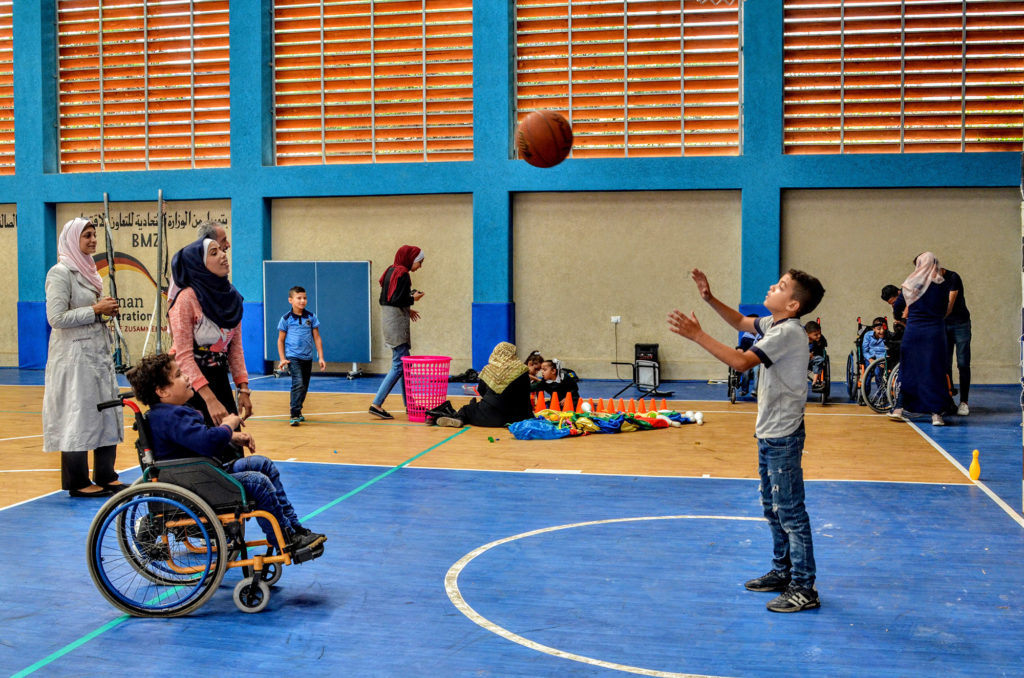

Anera’s medical donations team in Gaza procured essential medications for local healthcare clinics in addition to 80 wheelchairs, 40 sets of crutches, and 40 walkers for adults and children. Anera delivered these to the Society for the Physically Handicapped. The Program’s team also procured 6,400 blood bags for Shifa Hospital and the Central Blood Bank Society. Through this grant, Anera delivered its first shipment of cancer medication, capecitabine, to Gaza. Capecitabine is a chemotherapy tablet that helps with treatment of breast, colon, and rectal cancers. Anera also delivered a shipment of tacrolimus through this grant. Tacrolimus prevents the rejection of a kidney, heart, or liver transplant. In total, the grant covered five shipments of specialized medicines to Gaza, as well as medicines that treat chronic diseases.
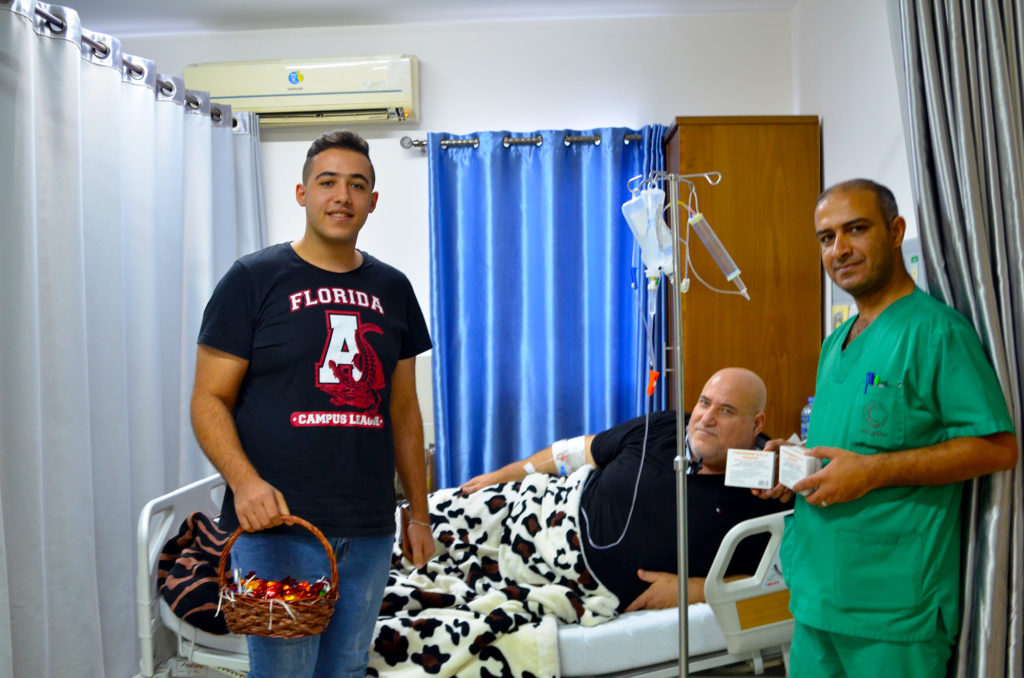

The medical donations team in the West Bank locally procured five different medicines including three antibiotics, an antacid, and a cholesterol medication. Anera delivered the medicines to eight recipient healthcare centers. The program’s team procured just over 45,000 units of the five medicines for these recipients. Anera completed four shipments and delivered 127,140 units of antibiotics. It also delivered 2,297,834 units of diabetes medication, 216,000 units of pregnancy vitamins, 330,900 units of analgesics, 400,034 units of antibacterials, and 72,000 units of antihypertensives. In total, Anera delivered 3,443,908 units of these important, heavily used medications. The over 2 million units of diabetes medication donated covered an estimated 28% of the total need for diabetes medication of Anera’s recipients.
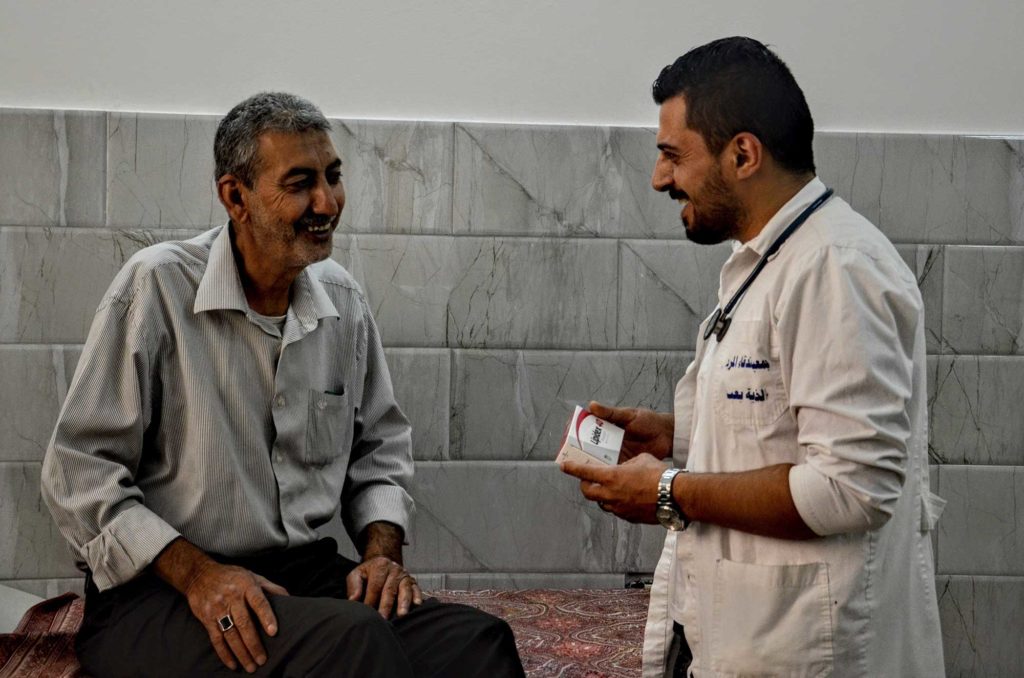

Women Can 1.0 | 2019
- Direct Beneficiaries: 109
- Indirect Beneficiaries: 792
One of the most vulnerable groups in Palestine is women-headed families, who make up 10% of households in the West Bank. To support women to generate their own income and thus enhance their resilience, Anera and IRUSA launched Women Can. The project supported and started a variety of businesses. Anera based the intervention on the beneficiaries’ interests and assets. These included small sheep farms, laying chicken farms, beauty salons, grocery stores, housewares shops, shoe shops, sewing, orchards, and other businesses. The project supported 109 marginalized families in starting new small enterprises or developing their existing businesses. As a result, it increased household income generation and enhanced their resilience. The program addressed the needs of women beneficiaries by training them to conduct business, providing needed business supplies, providing mentorship, and conducting capacity building activities.
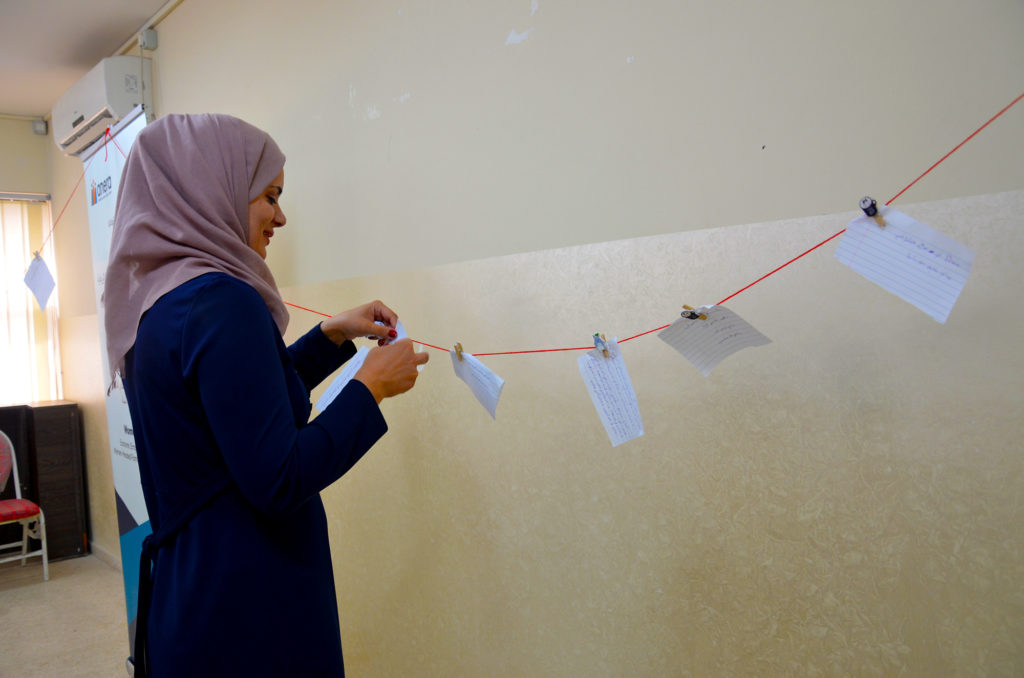

By the end of the project, 52 enterprises were already mature, operational, and generating a monthly income ranging from 90 to 900 USD. The remaining 57 made progress but required more time to reach maturity due to the impact of COVID-19, the novelty of the enterprise, the seasonality of some enterprises, and/or the need for more time to become productive.
Anera provided new equipment, tools, and other items to improve productivity. These also enabled entrepreneurs to augment income and gains. For example, catering businesses spent 3 hours preparing food that would have previously taken 8 hours. Supporting existing beauty salons enabled women to earn $60 per day instead of $15 per day.
By the end of the project, 34% of the beneficiaries had already made further additions and modifications to their enterprises. The beneficiaries made these on their own accord and at their own expense to improve operational opportunities. Ten percent of the beneficiaries had already started hiring more employees.
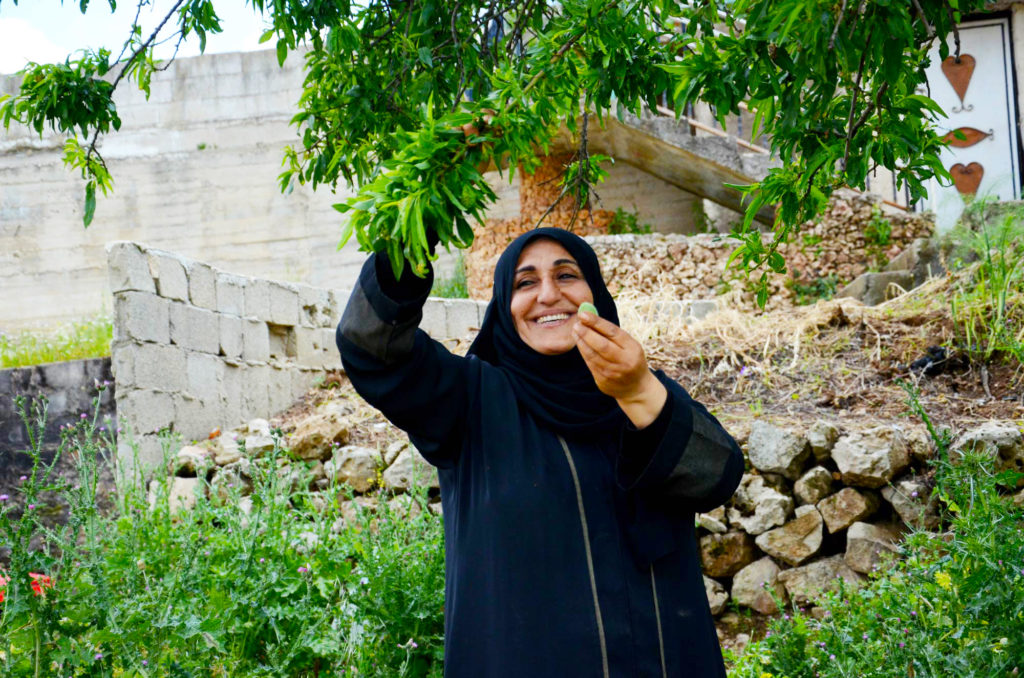

WASH III | 2019
- Direct Beneficiaries: 27,985
- Indirect Beneficiaries: 215
The third phase of the WASH program began in 2019 in Gaza. Anera conducted technical upgrades and installed infrastructure to ensure water access and sanitation. Anera also conducted educational campaigns for the local community. To support the educational aspect of the program, Anera distributed 1,800 hygiene kits to vulnerable families.
In total, 27,985 vulnerable people directly benefited from the WASH interventions. The beneficiaries included 424 persons with disabilities. The intervention targeted beneficiaries in nine different areas and 31 different communities. Anera connected 472 households to safe and new water networks in the Al Sabra area of Gaza City alone. It connected 605 more households to new wastewater networks in five targeted governorates. The installation of a new storm water network protected 65 households in the Al Sekka area from future flooding damage.
Anera’s team cleaned up 1800 storm water gullies during the winter season. The cleaning restored their effectiveness. It also protected 15 communities in Gaza City from the risk of flooding. Over the course of the program, Anera removed 201 cesspits in five targeted areas. Their removal improved public health and sanitation. The program created 215 temporary jobs during the implementation period. Those employed included engineers, skilled laborers, health promoters, and data collectors. Including both direct and indirect beneficiaries, WASH III brought hope and dignity to over 400,000 Gazans.
More than 90% of women learned the correct steps of hand washing after the project’s awareness sessions. Before the sessions, only 20% knew the correct hand washing steps. Beneficiaries confirmed that hand washing knowledge helped them to protect their families from the COVID-19 pandemic. More than 70% of women and their families changed their attitudes towards washing vegetables with clean water. Educational programming increases awareness and knowledge of best hygiene practices for underserved populations. By the end of the WASH III program, the wells, wastewater network improvements, and community education reached 44% of Gazans.
Ramadan Food Parcel Distribution | 2020
- Direct Beneficiaries: 23,868
To respond to the increased food security needs in Palestine stemming from the COVID-19 pandemic, Anera and IRUSA launched the Ramadan Food Parcel Distribution project to provide nutritious meals to vulnerable families during Ramadan 2020. Anera delivered food packages containing non-perishable foods high in protein and essential vitamins to 3,552 vulnerable families and 23,868 individuals. To prevent the spread of COVID-19, Anera provided beneficiaries and staff with personal protective equipment during the packaging and distribution process. We also updated our guidelines for disinfection and staggered pick-up times over a three-day period to ensure social distancing requirements could be met during the distribution process.
COVID-19 Emergency Response | 2020
- Direct Beneficiaries: Roughly 191,501
- Indirect Beneficiaries: 550
In response to the COVID-19 crisis in Gaza, Anera implemented a two-pronged humanitarian aid intervention to address critical livelihood and medical needs. The first of these joint interventions with support from IRUSA was a supplemental food program for 3,552 vulnerable households. Anera targeted the beneficiaries identified for the 2020 Ramadan food parcel distribution. Using the infrastructure in place for this program, Anera delivered fresh produce for four weeks. The produce included potatoes, tomatoes, onions, eggplant, and cucumbers that Anera sourced locally. Most of the produce came from 99 of Anera’s greenhouse program’s farmers. This created 99 direct and 550 indirect beneficiaries.
The second intervention was medical donations shipments, with IRUSA providing support to cover the cost of shipping. Anera delivered highly valued medicines and medical supplies to Gaza. Anera prioritized medications for conditions that put patients at greater risk of COVID-19, serving roughly 167,534 beneficiaries. We also prioritized equipment to protect first responders from COVID-19 infection. Anera designed the project to address food security, health challenges, and income loss in Gaza. This helped beneficiaries prepare for the inevitable escalation in COVID-19 cases.
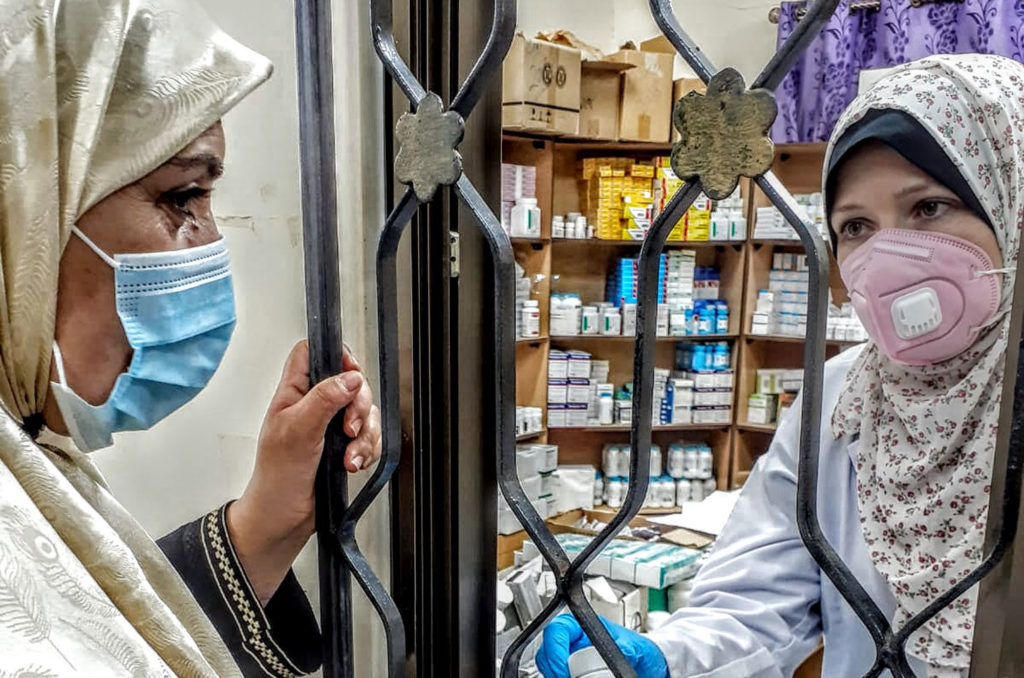

Gaza Emergency Response Food Vouchers | 2020
Thousands of vulnerable Palestinians faced increased economic instability and the loss of livelihoods because of the COVID-19 pandemic. In response, Anera and IRUSA provided 2,700 vulnerable families in Gaza with $65 food vouchers to meet immediate food needs at the onset of the pandemic. The program increased the food security and quality of life for vulnerable individuals in Gaza. The use of food vouchers rather than parcels allows families to meet their most pressing needs and maintain their dignity. Beneficiary families could use their food vouchers at 14 supermarkets, where they mainly purchased essential food products such as meat, dairy, oil, and rice, as well as hygiene products for their families.
Women Can 2.0 | 2020
- Direct Beneficiaries: 113
- Indirect Beneficiaries: 382
Following the success of the first Women Can, Anera and IRUSA launched the second iteration of the program in 2020. Women Can 2.0 provides economic opportunities for 235 women in the West Bank and Gaza. We tailored the program to respond to the unique needs created by the COVID-19 pandemic by training the women on how to operate a business during the pandemic.
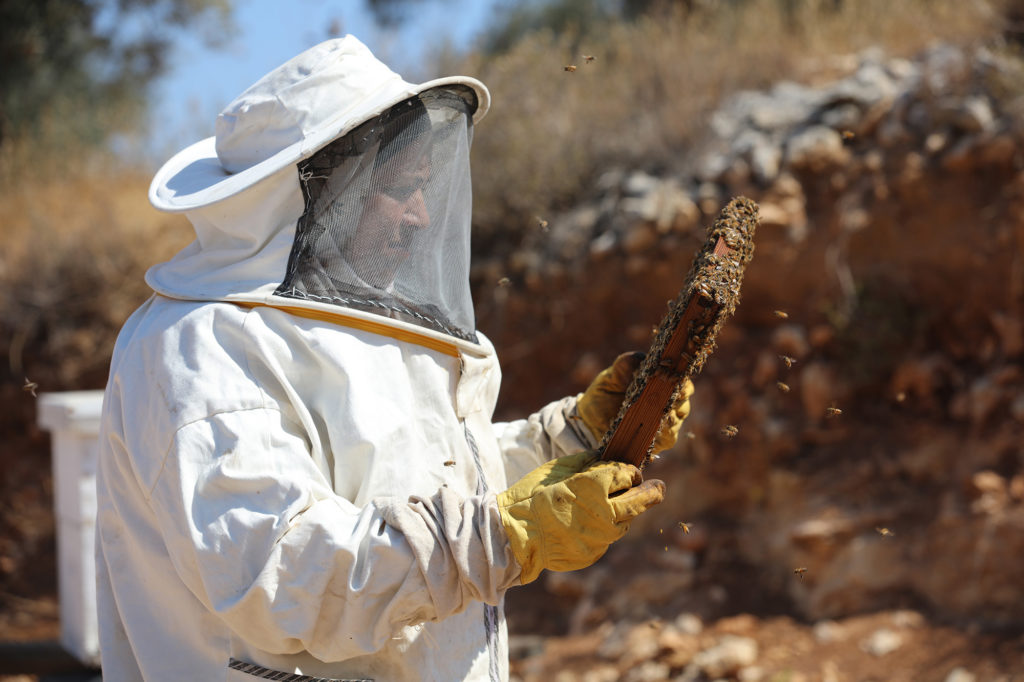

From March 2020 to August 2021, Anera, with generous support from Islamic Relief USA, targeted 113 women-headed households (benefiting 495 people, including family members) in the governorates of Ramallah and Salfit in the West Bank, and provided them with in-kind grants and start-up support worth an average of $2,350 per participant.
The participating women started new small businesses or developed existing businesses in several sectors, including agriculture and livestock, retail, and the service industry. Anera and IRUSA are now supporting 122 more women-headed households through a 12-month extension of the project. This includes 92 women in the West Bank, Ramallah, and northwest Jerusalem, and 30 women in Gaza. The Women Can 2.0 Extension runs from September 2021 to August 2022.
Ramadan Food Vouchers | 2021
- Direct Beneficiaries: 25,196
- Indirect Beneficiaries: 154
In 2021, Anera shifted its approach to Ramadan food security support, providing food vouchers instead of food parcels to 4,160 poor families in Gaza. The use of vouchers allowed families to maintain their dignity and choose the foods that best met their needs. This intervention enabled vulnerable families to secure nutritious foods to break their daily fasts throughout Ramadan. The project also allowed all targeted families to enjoy Ramadan without worrying about the cost of food.
The initiative was a response to increased poverty rates in Gaza because of the COVID-19 outbreak and the high unemployment it caused. However, the project also provided food security to families during the May 2021 hostilities in Gaza. Hostilities started only a few days after the distribution of vouchers. By the beginning of the conflict on May 11, 2021, beneficiary families had already used their vouchers. They had food at their homes to use during the eleven days of bombing that prevented other parties from providing assistance.
Gaza Emergency Medical Response | 2021
Following the May 2021 hostilities, Anera and IRUSA launched the Gaza Emergency Medical Response to provide partner hospitals and health clinics with medical supplies and medicines. Gaza’s ports and borders closed because of the escalation, which prevented residents from accessing medications needed to manage chronic conditions such as cancer, diabetes, heart disease, and high blood pressure. Gazans had no choice but to go without the proper medication and care necessary to manage their chronic conditions, which can lead to long term damage or death. At the time, a report from the central drug store indicated that around 50% of all essential drugs were at less than a one month stock in Gaza.
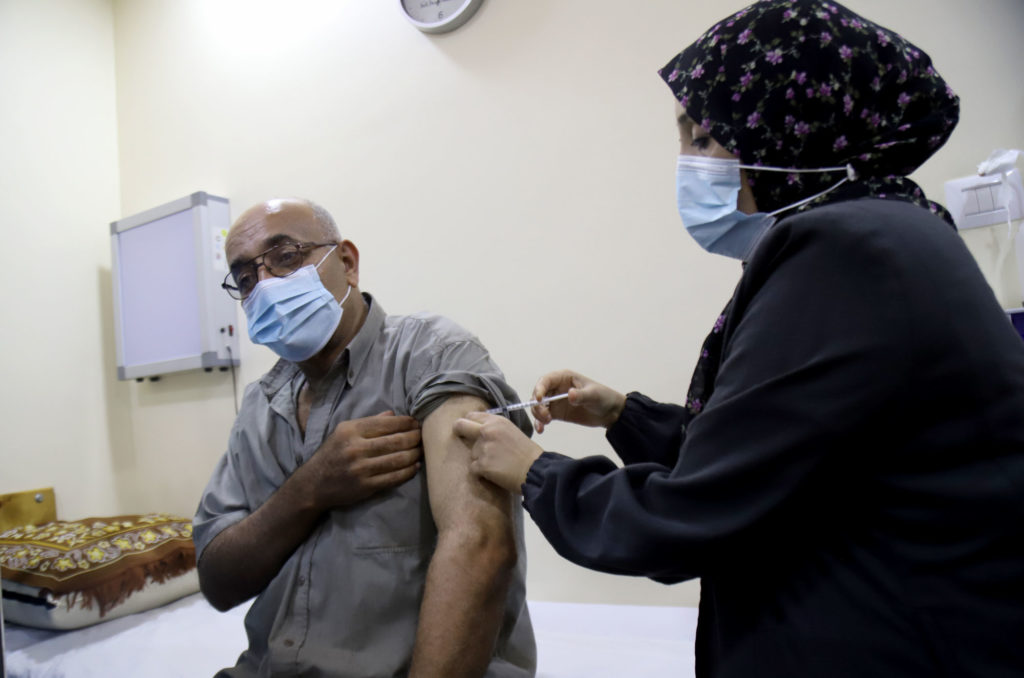

Through the Gaza Emergency Medical Response, Anera facilitated 16 shipments of medicines and medical supplies. It also locally procured 22 medicines to Shifa Hospital and three other clinics. The shipments included antibiotics, antipsychotics, insulin, PPE, and other urgently needed medicines and supplies. Twenty-five clinics and hospitals benefitted from the shipments. The locally procured medicines will benefit an estimated 8,411 individuals, and the estimated beneficiaries from the shipments will exceed 400,000 patients.
Eid al-Adha Supplementary Feeding Program | 2021
- Direct Beneficiaries: 86,823
- Indirect Beneficiaries: 110
Anera and IRUSA partnered to support the nutrition needs of 15,300 vulnerable families in Gaza during Eid al-Adha in 2021. Anera provided 2 kilograms of fresh meat to the beneficiary families, serving 86,823 people directly. The intervention exceeded its expected results and reached 486 additional families. The project targeted the most vulnerable members of the population, including female-headed households, persons with disabilities, and households who lost their income due to COVID-19.
The Eid al-Adha program built on the progress made through the previous use of food vouchers and parcels during Ramadan, increasing food security and nutrition for thousands of families in the area by distributing over 31,572 kg of fresh meat (2 kg per family). The project also increased the economic vitality of the livestock market. It supported 110 workers in a sector that experienced extremely low demand due to high poverty and unemployment rates since the outbreak of COVID-19. This supported the livelihoods of hundreds of farmers and producers.
Food Security and Livelihoods Support | 2021
- Direct Beneficiaries: 15,620
- Indirect Beneficiaries: 50
Anera and IRUSA began the Food Security and Livelihoods Support program in October 2021. The ongoing program aims to improve the food security status and enhance the livelihoods of vulnerable families in Gaza as part of Anera’s long term response to the May 2021 conflict in Gaza. The project’s main goal is to rehabilitate destroyed agricultural infrastructure, targeting farmers who lost the proper functioning of their greenhouses and livestock barns due to the recent hostilities and chronic economic issues. This will sustainably increase food security at the family level. It also provides income generating opportunities and decreases dependence on temporary international aid.
In the first part of the program, Anera delivered food vouchers to 2,500 vulnerable families. The vouchers enabled them to secure their basic food needs from nearby markets for at least one month. The second part of the program includes restoring agricultural activities for 240 families by repairing greenhouses damaged during the May 2021 conflict. This will enable them to produce at least 60% of their fresh produce needs. Families will also be able to sell any surplus produce to supplement their family income.
Anera will restore agricultural activities for these families by rehabilitating their properties and providing vegetable seedlings. Within three months, farmer beneficiaries will start generating income, but their properties will remain functional for years to come. This will make them more resilient and improve their livelihoods over time. The final part of the program includes rehabilitating the livestock barns of 100 families to increase their productivity.
WASH IV | 2021
- Direct Beneficiaries: 70,620
- Indirect Beneficiaries: 185,000+
The fourth iteration of Anera and IRUSA’s WASH program began in 2021. The program aims to address the urgent WASH needs of Gazans while mitigating the consequences of long-term climate change such as flooding, water salination, and rising surface temperatures. Through these WASH interventions, Anera improves community-level infrastructure, promotes hygiene practices, and ensures safe and sustainable access to water and sanitation. It also reduces the risk of flooding and contamination in poor communities in Gaza.
As of October 2021, Anera completed the urgent repair of wastewater networks at Al Yarmouk Street, Al Jalaa Street, Al Jawhara tower, and Al Jalaa tower in Gaza City, connecting more than 10,000 people to new wastewater networks. Anera then conducted urgent repairs of wastewater and water networks at Al Ba’ali area and Old Gaza Street in Beit Hanoun, connecting more than 3,000 people to new water networks. Recently, Anera began excavating boreholes in Asqula storm basin and reconstructing the water well at Al Mughraqa. In conjunction with infrastructure development, Anera has conducted 71 awareness sessions on sanitation and hygiene for 1,525 women. Overall, the program has targeted over 66,080 Gazans who now have increased access to water and sanitation services.
Before the end of WASH IV, Anera is currently implementing an additional component that serves another 47,750 people. Through the add-on, Anera is providing 56 households with increased access to hygiene services by installing solar heaters and water tanks. In addition, Anera is providing 1,500 more women with hygiene awareness sessions and hygiene kits. Overall, 33,000 individuals will benefit from increased water and wastewater networks capacity. Some 4,450 individuals will benefit from the installation of new wastewater network equipment, 10,000 beneficiaries will be protected from seasonal flooding in two areas, and 56 households will have increased access to hygiene services because of the project extension.
Since 2017, Anera and IRUSA’s WASH programs have improved the lives of over 836,000 Gazans by increasing access to water, improving wastewater management, and improving sanitation and hygiene habits in targeted communities. In total, the wells, wastewater network improvements, and community education under Gaza WASH I-III have reached 44% of Gazans. Anera anticipates its combined WASH projects with IRUSA will reach over 50% of Gazans by the conclusion of Gaza WASH IV in July 2022.
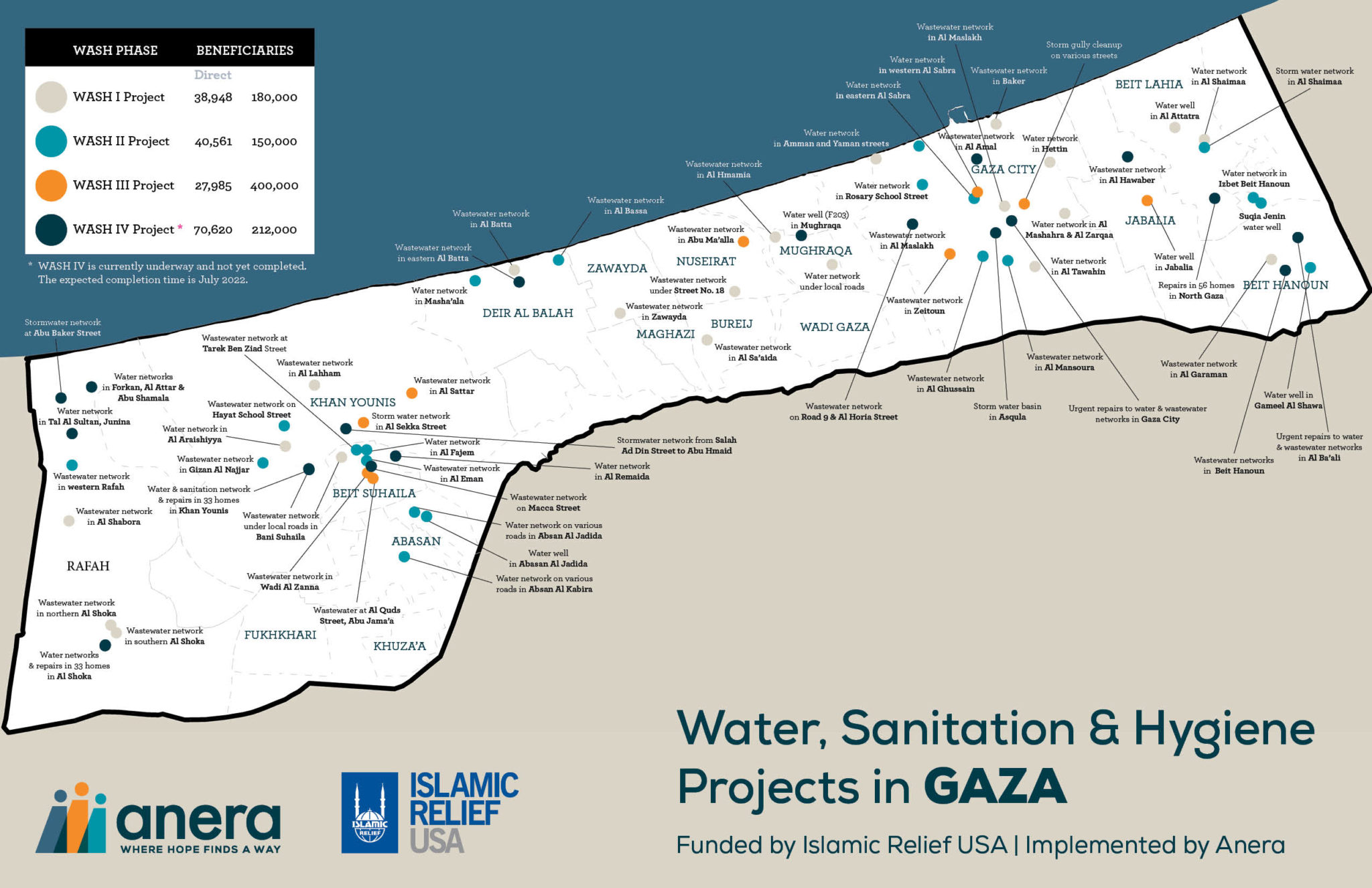

The views expressed herein are those of Anera and shall not, in any way whatsoever, be construed to reflect the official opinion of IRUSA, its Islamic Relief affiliates, or its donors.
OUR BLOG
Related
In Gaza, systematic bombardment of civilian housing and infrastructure has created a crisis of shelter that is endangering over a million.
The undersigned members of the Association of International Development Agencies (AIDA) urgently call upon the international community to intervene and halt settler attacks targeting Palestinian civilians and protect Palestinian communities near illegal settlements. The International NGO Community urges international actors…

